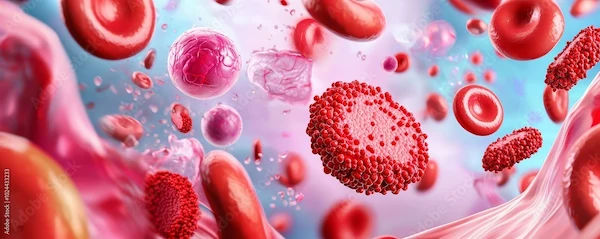How To Reduce Heart Rate?
Discover effective ways to lower your heart rate naturally. Learn lifestyle tips, breathing techniques, and when to seek medical help for a healthier heart.

Written by
Last updated on 3rd Jul, 2025
A healthy heart rate is essential for overall well-being. While your heart rate naturally fluctuates based on activity, stress, or emotions, a consistently high heart rate (tachycardia) can be concerning. If you've noticed your heart beating too fast, don't panic—there are simple and effective ways to bring it back to a normal range.
What is a Heart Rate?
Your heart rate, or pulse, is the number of times your heart beats per minute (bpm). A normal resting heart rate for adults ranges between 60-100 bpm. Athletes or very active individuals may have a lower resting heart rate (around 40-60 bpm) due to better cardiovascular fitness.
When Is a High Heart Rate a Concern?
A temporary increase in heart rate due to exercise, stress, or caffeine is normal. However, if your heart rate stays high at rest without an obvious reason, it may indicate:
Anxiety or stress
Dehydration
Overconsumption of caffeine or alcohol
Underlying heart conditions (like arrhythmia)
Thyroid disorders
Fever or illness
If you experience dizziness, chest pain, fainting, or shortness of breath along with a high heart rate, seek medical help immediately.
Effective Ways to Lower Your Heart Rate
Below are the effective ways to lower your heart rate:
1. Practice Deep Breathing
Slow, deep breathing activates the vagus nerve, which helps regulate heart rate. Try this:
Sit or lie down comfortably.
Inhale deeply through your nose for 4 seconds.
Hold for 4 seconds.
Exhale slowly through your mouth for 6 seconds.
Repeat for 5-10 minutes.
2. Stay Hydrated
Dehydration forces your heart to work harder. Drink enough water throughout the day, especially if you're active or in hot weather.
3. Reduce Stress with Relaxation Techniques
Chronic stress keeps your heart rate elevated. Try:
Meditation (even 5-10 minutes daily helps)
Yoga or gentle stretching
Listening to calming music
Spending time in nature
4. Limit Caffeine and Alcohol
Both can cause heart palpitations and raise your heart rate. If you're sensitive, reduce coffee, energy drinks, and alcohol.
5. Exercise Regularly (But Wisely)
Regular physical activity strengthens your heart, helping it pump more efficiently. However, avoid overexertion. Start with moderate exercises like:
Brisk walking
Swimming
Cycling
6. Get Enough Sleep
Poor sleep stresses the body, increasing heart rate. Aim for 7-9 hours of quality sleep each night.
7. Eat a Heart-Healthy Diet
Certain foods help stabilise heart rate:
Bananas, spinach, and avocados (rich in potassium)
Fatty fish (salmon, mackerel) (omega-3s support heart health)
Nuts and seeds (magnesium helps regulate heartbeat)
Limit processed foods and excess salt
8. Try the Valsalva Maneuver
This simple technique can help slow a racing heart:
Pinch your nose, close your mouth.
Gently try to exhale (as if blowing up a balloon) for 10-15 seconds.
Release and breathe normally.
9. Avoid Smoking
Nicotine increases heart rate and blood pressure. Quitting smoking improves heart health significantly.
10. Maintain a Healthy Weight
Excess weight makes the heart work harder. A balanced diet and regular exercise help maintain a healthy weight.
When to See a Doctor?
While occasional fast heartbeats are normal, consult a doctor if:
Your resting heart rate is consistently above 100 bpm.
You experience irregular heartbeats (palpitations).
You have chest pain, dizziness, or fainting spells.
A doctor may recommend tests like an ECG, Holter monitor, or blood tests to check for underlying conditions.
Conclusion
Managing your heart rate is crucial for maintaining overall heart health. By incorporating lifestyle changes such as regular physical activity, stress management techniques, and a balanced diet, you can help reduce your heart rate naturally. Additionally, breathing exercises and staying hydrated play a significant role in calming your heart. However, if you experience persistently high heart rates or other symptoms, it is essential to consult a healthcare professional to rule out any underlying conditions. Taking proactive steps today can lead to a healthier, more balanced heart in the long term.
Consult Top Cardiologist
Consult Top Cardiologist
Dr. Dixit Garg
Cardiologist
10 Years • MBBS , DNB (General medicine) , DNB (cardiology)
Gurugram
Smiles & Hearts, Gurugram

Dr. Mangesh Danej
Cardiologist
8 Years • MBBS, MD (General Medicine), DNB (Cardiology)
Pune
Dr Danej clinic, Pune
(375+ Patients)
Dr. Sibashankar Kar
Cardiologist
10 Years • MBBS, DNB
Bhubaneswar
Hi-Tech Medical College & Hospital, Bhubaneswar

Dr. Badri Narayana Tumulu
Cardiologist
36 Years • MBBS; MD (Med.), DM (Cardio)
Nandyala
Lotus Diagnostics Nandyal, Nandyala
Dr Rohit Kumar
Cardiologist
10 Years • MBBS, MD Medicine, DM Cardiology
Kolkata
Calcutta Medical Research Institute, Kolkata
(125+ Patients)
